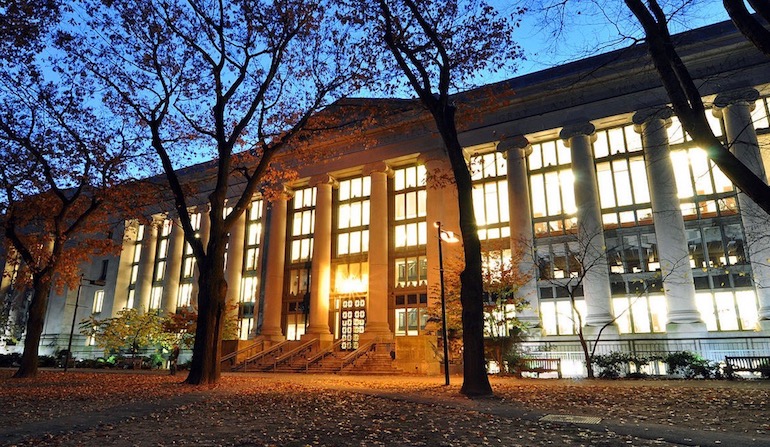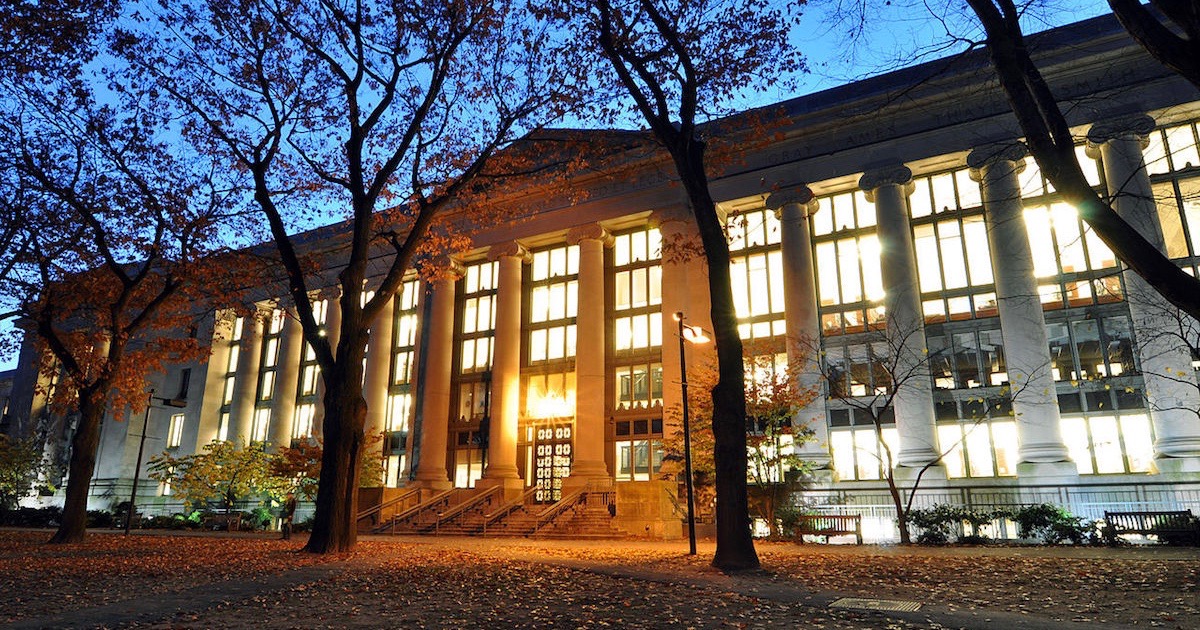 Education
Education
Harvard Law Professor — Ban Homeschooling for “Question[ing] Science”


Ban it for other reasons as well, says Professor Elizabeth Bartholet in a stunning article for Harvard Magazine. That’s right, the only form of education in the country that hasn’t been upended by the coronavirus. Well, that is a poorly timed proposal.
Bartholet warns that homeschoolers are subject to child abuse, and are poorly prepared to participate in a democracy, having been oppressed by “essentially authoritarian control” by parents who are potential illiterates themselves. As depicted by Bartholet, homeschooling sounds little better than being in fundamentalist Christian prison. In fact, the illustration that goes with the article shows a girl behind bars in a house fashioned from books, on Reading, Writing, Arithmetic, and the Bible.
The article, by Erin O’Donnell, attacks a homeschooling group, while (as Rod Dreher points out) getting the name wrong — it’s the Home School (not “Home Schooling”) Legal Defense Association — and while giving the HSLDA no opportunity to speak in its own defense. Hey, that sounds familiar. It’s how Discovery Institute is routinely treated by critics whenever the subject of evolution education comes up.
In the article, Erin O’Donnell cites the Harvard Law scholar:
Bartholet notes that some of these parents are “extreme religious ideologues” who question science and promote female subservience and white supremacy. [Emphasis added.]
No doubt some homeschool parents, and some public school parents as well, subscribe to unwholesome ideologies. It’s a big country. Bartholet points to the author of a recent book who recounts her own experience as “the daughter of Idaho survivalists who never sent their children to school” and who, in this context, “endured abuse by an older brother.” Says Bartholet, “That’s what can happen under the system in effect in most of the nation.”
The Homeschool Manner
Yes, it can happen. Lots of things can happen in life. But what goes on in public school at its worst is horrific, too: including bullying, mass shootings, sexual predation by teachers, political and other ideological indoctrination, and some pretty lousy, lackadaisical education.
I had a very positive experience of public schools myself, and we have never homeschooled our kids. But I admit to a recurring case of homeschool envy. The homeschooled students and graduates we know are exceptionally poised, articulate, smart, and well-educated people. These are all qualities that will set them up for success in later life. A family who are neighbors of ours homeschooled four kids, and sent not one, not two, but three to Princeton. We had a guest in our home recently, a young woman about 30 years old. My high school-age daughter later asked me, “Was she homeschooled?” That was a shrewd call: In fact, the woman was homeschooled, as I was aware but my daughter wasn’t. More than a decade after finishing high school, the giveaway was a certain poised, mature, and thoughtful manner. I’ve found it to be almost a signature of the homeschooling demographic.
What I’ve seen of homeschool curricula blows me away. Again, I had some very good public school teachers, including one whom I’d call life-changing. But an in-depth exposure to a bookcase of classic texts? A tour of great ideas led by a dedicated parent-teacher who hasn’t taught the same canned curriculum for decades but, instead, is exploring with you? No, I didn’t get that. From what I’ve observed, since I was a kid the schools have not improved.
The Burden of Proof
Obviously there are some parents who are not suited for a teaching role, and some students for whom it’s not a good fit either. You could cite cases where homeschooling failed, as you could cite cases where conventional schooling failed. You could find instances where homeschool students are socially “isolated,” though I’m told that homeschool parents go out of their way to make sure their kids get to spend time with other kids. I’ve personally pulled a child out of public school and returned him to a small private school because he was “isolated,” lonely, and unhappy in the crowded setting. So what really underlies the itch not just to criticize homeschooling but to place it under a “presumptive ban”? Bartholet proposes to place the burden of proof on parents, to make them show, to the satisfaction of the government, that they are fit to teach their own children.
If a “grownup” manner is a giveaway that someone was homeschooled, then the insistence on forbidding choices — because the choices work against homogenized thinking — is a telltale sign of authoritarianism. Professor Bartholet is against “question[ing] science.” She feels “it’s also important that children grow up exposed to community values, social values, democratic values, ideas about nondiscrimination and tolerance of other people’s viewpoints.” That all sounds great, but we know that in practice those can be newspeak codewords for training young people to respond to life in rigid, programmed, ideologically approved ways.
Teaching the Controversy
I’m sure Bartholet would be horrified by the approach to evolution education that urges giving teachers freedom to teach “both sides of the controversy.” Surely to “question science” should be banned, along with homeschooling.
The Harvard Magazine article links to a law review article by Bartholet where she worries that “Many [parents educating at home] use alternative textbooks that teach creationism instead of evolution.” She doesn’t say what she means by “creationism.” But she refers in a footnote to an article from ProPublica, similarly fretting that “many use alternative textbooks that teach creationism instead of evolution.” (The language is identical but Professor Bartholet omits quotation marks.) ProPublica itself (a different reporter) has mangled Discovery Institute’s science education policy, and refused to correct the error, equating “teaching the controversy” with teaching intelligent design, and equating ID with a “more nuanced outgrowth of creationism.” So in the view of Bartholet’s media source, educating students to exercise critical thinking about evolutionary theory basically means “teaching creationism.”
That’s what they’re teaching at Harvard Law! In reality, thinking critically about statements made in the name of science, comparing them with other evidence and other understandings, seeking the truth by questioning assumptions, is crucial to the practice of science. Some Harvard scientists could probably assure Elizabeth Bartholet of that if she asked.
Bartholet says, “I think it’s always dangerous to put powerful people in charge of the powerless, and to give the powerful ones total authority.” On that, she’s certainly right. I may be over-idealizing the homeschool experience, but to lose it as an option for parents would be a big win for elite cultural stereotyping and for mind control.
The comments under the Harvard Magazine article, by the way, are worth perusing. They’re all critical. The first one, from a mom in North Carolina, begins, “This article is sad in its total inaccuracy. First off 90% of homeschoolers are not Conservative Christian. I have homeschooled for 8 years and we are atheists.”
Photo: Harvard Law School, by Chensiyuan. / CC BY-SA.
